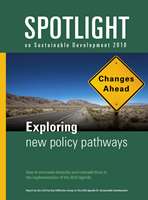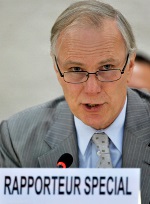Published on Tue, 2018-11-06 00:00
In France, a High Level Steering Committee for the implementation of the SDGs held its first meeting in April 2018 as a forum to debate and collectively build, with public and private actors, a ‘roadmap’ to be issued in the fall of 2019.This move was applauded by the ATD Fourth World Movement for being inclusive, but also criticized as “coming late”. ATD Fourth World finds “very little effort to synergize the various objectives, and "not a major concern" for poverty in France. The Movement hopes “that the enforcement of each SDG reaches the poorest, on the national territory as well as in the international development cooperation by France” and it campaigns in particular on the issue of unemployment (currently 9 percent in France) demanding “access to work as a right, just as the right to education or the right to social security”. |
Published on Fri, 2018-11-02 18:09
Three years into the implementation of the 2030 Agenda for Sustainable Development, concerns continue about stalled indicators, missing indicators and proliferating and potentially competing data sources, which makes it difficult to assess progress (see GPW Briefings #22: The Ups and Downs of Tiers: measuring SDG progress; #23: SDG Indicators-the forest is missing). Initiatives abound in the shifting terrain of the generation, validation and use of data to satisfy the demands of a growing market of players. In addition to the work of the UN mandated Inter-agency and Expert Group on SDG Indicators (IAEG-SDGs), these concerns and challenges have drawn the attention of a number of official statisticians and practitioners. |
Published on Fri, 2018-10-26 18:41
Rather than reaching the goal of ending hunger that is called for in SDG 2, the world is on track to increased and more exacerbated food insecurity. Since the adoption of the SDGs in 2015, global rates of food insecurity have increased – with some 815 million people facing hunger and malnourishment, and it is estimated that this number will continue to increase. The present understanding of the root causes of hunger and malnutrition and of the policy solutions that can support long-term, structural change, is not sufficiently up to speed with the kind of shifts that need to take place. A radical shift is needed. Eradicating hunger requires a radical shift from dominant food system models and development paradigms, towards addressing the food system as a whole, and creating enabling public policies that address key issues affecting food insecurity and malnutrition. Mainstream monitoring of food security and nutrition fails to address the critical questions around the social control of the food system, and in particular natural resources, and proposes solutions based on the current industrial model of production that feeds a global, and inherently unequal economy. |
Published on Fri, 2018-10-26 18:34
The aftermath of the Global Financial Crisis (GFC) which began in 2008 is still with us. The widespread macroeconomic downturn which followed the GFC's outbreak has been contained and growth of GDP has been restored, though not at rates which have repaired earlier losses. The post-crisis reform agenda is still being put in place but without a consensus as to the relative importance of different causes for the GFC and thus as to the importance of the different reforms required. The seriousness of the crisis in the autumn of 2008 had several manifestations. Global credit markets were no longer functioning. GDP in the United States was falling at an annual rate of nearly 7 per cent. The S&P index of US stock prices had fallen by 40 per cent. |
Published on Thu, 2018-10-25 14:58
Widespread privatisation of public goods in many societies is systematically eliminating human rights protections and further marginalising those living in poverty, according to a new report. Philip Alston, the UN Special Rapporteur on extreme poverty and human rights, criticised the extent to which the World Bank, the International Monetary Fund, and even the UN itself have aggressively promoted widespread privatisation of basic services, without regard to the human rights implications or the consequences for the poor. He also criticised human rights groups for not responding strongly enough to the resulting challenges. |
SUSCRIBE TO OUR NEWSLETTER







